Ensure you follow HUD guidelines when boarding windows and doors. In some situations, you may require written approval in advance of blocking windows and doors. The circumstances in which it is usually appropriate to board a property are as follows:
- If the property has been seriously damaged by excess water, a fire or any natural disaster.
- There are ongoing safety issues that need to be addressed.
- The property is located in an area in which vandalism is common, and boarding represents the most appropriate means of securing the property.
- The property is located in an area in which boarding is pre-approved.
If boarding is approved, ensure that all first and ground floor windows, including the basement, are covered with a strong plywood covering that adheres to the specifications outlined below. The board should cover the entire frame and window and should be secured in place with carriage bolts. Ensure these bolts are placed in a manner that does not represent a health and safety risk.
If there are any security bars on the windows or they are too small for someone to climb through them to access the property, they do not need to be boarded up.
You do not need to board up the windows above the first floor unless these can be accessed without the use of a ladder or from an adjacent property, and the window is large enough for someone to climb through. Any windows that don’t need to be boarded should be fully secured.
Remove any broken glass from around windows and doors.
If the local codes differ from the HUD regulations, follow the local codes.
Materials Used For Property Preservation Boarding
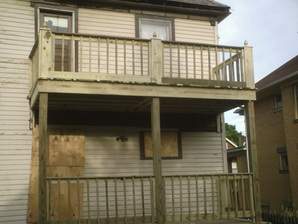
- 1/2″ Plywood for windows
- 3/4″ or 5/8″ Plywood for doorways
- 2″ x 4″ studs
- 3/8″ or 1/2″ x 12″ long Round-Headed Carriage Bolts
- 3/8″ or 1/2″ Nuts for the Carriage Bolts
- 3/8″ or 1/2″ Washers
- NO SCREWS AND NO OSB!!
Window Boarding Diagram
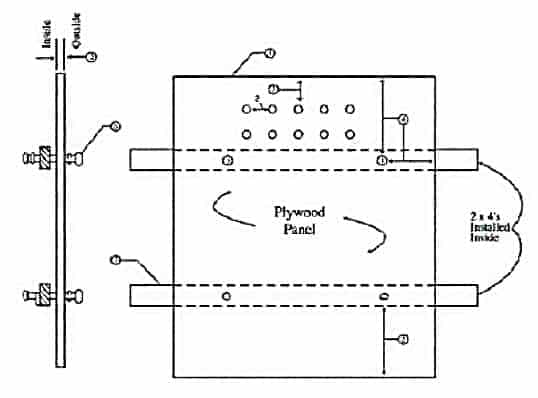
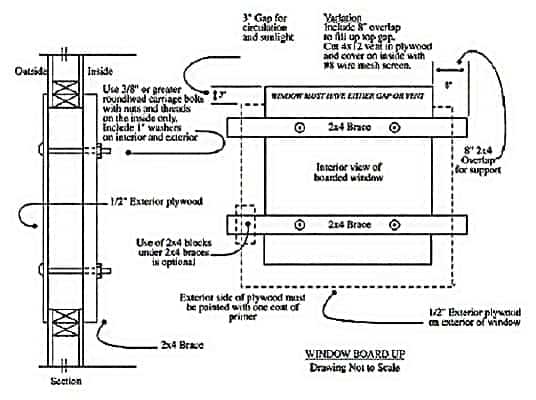
Door Boarding Diagram
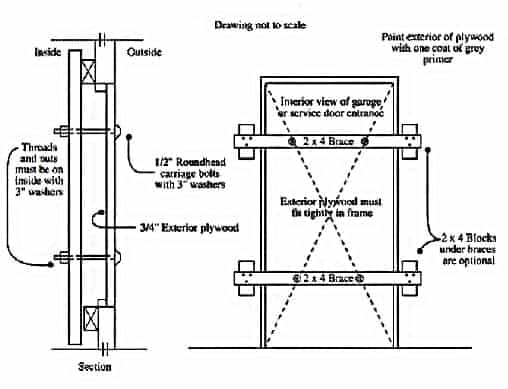
Los Angeles: Diagram Showing Installation of Security Screens
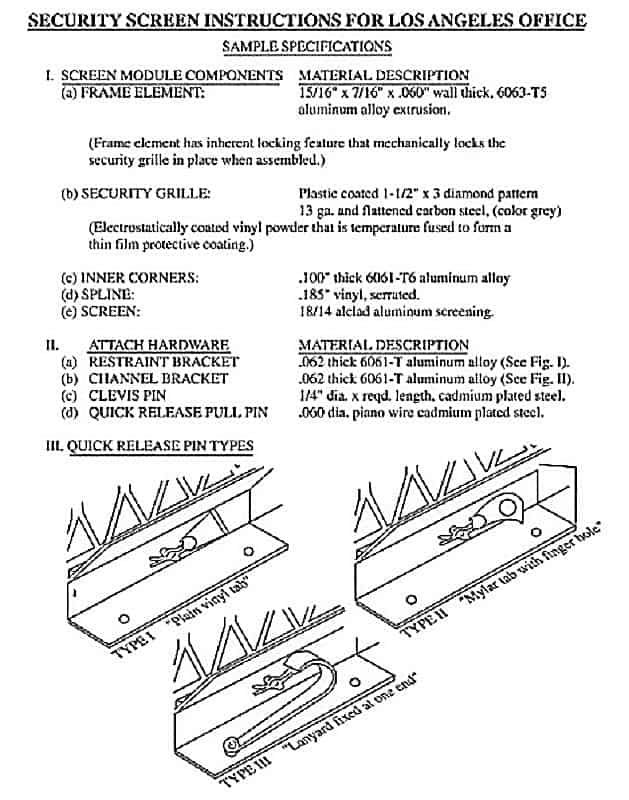
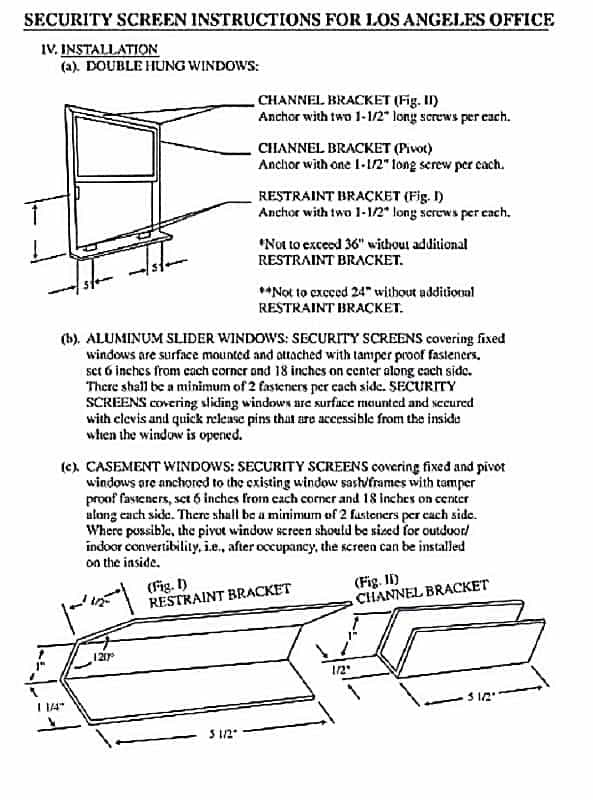
Videos Showing How To Board Windows and Doors
FHA Attachment Regarding Boarding Requirements and Nationwide Price Schedule
Mortgagees should not board a property unless they have prior written approval from the M&M contractor, and/or:
- The property is severely damaged by fire, flood or other natural disaster;
- The property should be secured for safety reasons;
- The property is in a high vandalism area and boarding is the only reasonable means to protect the security of the property;
- The property is located in a pre-approved boarding area.
When boarding is appropriate, all first floor windows and doors and all basement windows and doors should have plywood covering the entire opening and frame. The covering should be secured with carriage bolts.
Eliminate any health and safety hazard caused by any protruding bolts used to secure boarding. The use of nails is prohibited. The cost of boarding properties is not included in the maximum allowable limit per property. Before and after photographs are required. HUD will not reimburse the Mortgagee for unauthorized boarding. Mortgagees should request prior written approval from the M&M contractor if the cost of securing a severely damaged property exceeds $550.
There should be no boarding above the first floor unless entry is possible without use of a ladder, and the opening is large enough for a person to easily pass through. Openings above the first floor that do not meet this test should be secured but not boarded.
Second story and higher openings are typically accessible only from attached properties, stairwells or fire escapes. If security bars are located on windows/doors, boarding is not required. Openings too small for a person to pass through, particularly pet openings in doors, should be secured but not boarded. To ensure that no hazards exist, remove all broken glass from the windows and surrounding interior and exterior areas.
All properties should be boarded in accordance with local codes. If local codes differ from HUD requirements herein, local codes supersede.
For the purpose of this document, the definition of united inch is length plus width.
I. Specifications for Plywood Boarding
- Exterior plywood should be of un-sanded CDX grade.
- Plywood thickness should be 1/2” for window openings, 5/8” for door openings and 3/4” for sliding door and French door openings. When extra large window openings are encountered use 5/8” or 3/4” as necessary.
- All holes should be drilled to accommodate bolts. The holes in the top of the plywood should be 12” down from the top and 20% of the width of the plywood cover, in from the side.
- The holes in the bottom should be 25% of the height of the plywood, up from the bottom and the same distance in from the side as the top.
- Carriage bolts mated with nuts and two three inch flat washers as shown in the side view. Washers to be of sufficient size to fully accept the square portion of bolt beneath the head. Bolt and mating hardware may be galvanized or cadmium plated. 3/8” x 12” bolts should be supplied with each 2’8’ door, 3’0” door, and glass sliding door cover. 3/8 x 10” bolts should be supplied with the rest.
- 2” x 4” lumber should be graded and should be a minimum of 16” longer than the width of the plywood cover. (Note: 2x4s will be drilled with 1/2” diameter holes that line up with the holes in the plywood covers.)
- All windows and doors, except the front door, through which access to the interior of the dwelling is made, should be secured. All window boards will be cut to fit inside the concrete block or brick opening with a maximum 1/8” clearance. THE PLYWOOD COVERING SHOULD BE OF ONE CONTINUOUS PIECE WHEN POSSIBLE.
- All fabricated parts and ancillary materials become property of the Department of Housing and Urban Development.
- All coverings are to be fabricated according to the attached drawing and specifications.
II. Boarding Windows
- Except as noted below, all window sashes, frames, glass and hardware are to be undamaged by the boarding installation.
- All screen inserts are to be removed, marked as to location and stored in a convenient closet or in the utility room.
- In all cases where it is possible to adjust the position of the sashes to accommodate the specifications for boarding above, the sashes are to remain in the frame.
- In instances wherein the sashes cannot be adjusted to accommodate the boarding specifications above, the sashes are to be removed from the frames and stored in a convenient closet or in the utility room. This includes all stationary lights secured by stops.
- In cases wherein the sash cannot be removed and/or the frame is permanently built into the house and cannot be removed (i.e., Fenestra windows) it will be necessary to break the corner panes to accommodate the boarding and bolts. If the location of bolt holes, in the plywood, requires modification because of the muntin bar (a small bar that divides a windows glass), these locations are to be modified. In no case, in any type of window, is any sash or frame part to be damaged.
- In all instances where items should be removed from the frame and stored, the items should be clearly marked as to the area from which it was removed.
- All items are to be stored on edge and braced to prevent accidental tipping, sliding, etc. In no instance is any item to be stored laid flat.
- Hinged windows are to be completely removed from the frame and stored as stated in (7) above. If possible the hinge pins are to be removed and remain with the removed item.
- Faced nailing of panels to wood frame windows is prohibited
Local Variations from General Requirements
ATLANTA Homeownership Center
Illinois
Install cloth screening. Cloth screen first floor openings in zip codes:
60429 60426 60411 60466 60477 60443
Screening of wood windows is accomplished by framing the window with 2x2s. The screening is stapled over the frame and fastened with 1×2 furring laths.
Chicago, Illinois
Install Plywood boarding in the following pre-approved Chicago zip code areas following the Chicago boarding requirements below.
60608 60609 60610 60612 60615 60616
60617 60619 60620 60085 60621 60622
60623 60624 60627 60628 60636 60637
60643 60644 60649 60651 60653
Rule 1. All openings in a structure which may be accessed from ground level and/or within 8 feet in any direction of an exterior stairway, fire escape, ramp, porch or other exterior construction reachable from ground level or a public way should be secured to prevent entry by unauthorized persons. One building entrance should be secured with a door of either solid core wood or steel construction, having no window in the door, and the door should be securely locked to allow access only to authorized persons. Said door should be secured with a through-bolted hasp and padlock if the door swings in.
Materials
Rule 2. If plywood materials are used to secure buildings, such materials should be no less than 5/8-inch thick, exterior grade. Particleboard, wafer board, Masonite or other similar materials should not be used for purposes of boarding-up a building.
Rule 3. Mechanical fasteners used for wood board-up materials should be round-head non-slotted carriage bolts no less than 3/8-inch in diameter with washers and nuts on the interior face.
Installation Methods
Rule 4. The primary method of securing plywood boards should be by the use of through-bolt compression fastening, using plywood on the exterior face and wood bracing constructed of minimum 2-inch by 4-inch (nominal) lumber installed on the interior side of the opening to be secured, perpendicular to the long dimension of the opening. Such bracing should extend at least 6 inches beyond the edge of the opening on each side in order to be securely braced against the building structure.
Rule 5. Wood construction used to secure a building opening should contain at least one bolt in each corner and additional bolts no more than four feet on center continuously along the perimeter. Each bolt should fully penetrate the wood bracing on the interior side of the opening.
Rule 6. In the event that the through-bolt compression fastening is impossible due to the construction or condition of the opening, the opening should be covered with plywood secured with minimum 3-inch-long wood screws fastened on 4-inch centers around the circumference of the opening.
Florida
Boarding is pre‑approved in the following zip code areas:
Miami:
33004 33009 33010 33012 33013 33014
33020 33023 33034 33054 33055 33056
33060 33069 33122 33125 33127 33128
33130 33131 33132 33136 33137 33138
33142 33147 33150 33157 33161 33167
33168 33169 33170 33177 33181 33190
33311 33315 33316 33401 33403 33404
33405 33407 33426 (east of 1‑95) 33435 33441
33444 33460 33462 (east of 1‑95)
Exterior surface and edges of all plywood should be painted with one coat white primer and one cost white finish. Use of screws to secure panels to wood frame windows is prohibited. See plywood-boarding diagram on page 27.
Caribbean
Exterior surface and edges of all plywood should be painted with one coat white primer and one coat white finish. Use of screws to secure panels to wood frame windows is prohibited. Additionally, boarding is pre‑approved in the following zip code areas:
00923 00924 00929 00601 00602 00603
00703 00704 00705 00610 00612 00714
00616 00617 00794 00915 00956 00957
00959 00961 00622 00623 00725 00627
00729 00920 00921 00979 00982 00983
00985 00986 00987 00962 00736 00735
00935 00638 00739 00769 00782 00907
00783 00780 00926 00646 00647 00738
00650 00934 00652 00653 00784 00656
00965 00966 00967 00968 00969 00970
00971 00778 00659 00917 00660 00791
00662 00913 00664 00795 00777 00667
00669 00670 00771 00772 00911 00773
00674 00909 00606 00707 00680 00715
00676 00687 00718 00719 00720 00723
00624 00716 00717 00728 00730 00731
00734 00740 00741 00678 00677 00745
00925 00926 00927 00637 00688 00952
00751 00690 00683 00685 00757 00907
00909 00911 00912 00913 00953 00949
00976 00641 00692 00693 00901 00765
00766 00767 00698
EXCEPTION: There is no pre-approved boarding in ANY gated community within these zip code areas.
PHILADELPHIA Homeownership Center
Connecticut
Boarding pre‑approved in the following zip codes areas for the cities of:
Bridgeport: 06601 06604 06605 06606 06607 06608 06610 06611
06612 06614 06615 06650 06673 06699
New Haven: 06501 06502 06503 06504 06505 06506 06507 06508
06509 06510 06511 06512 06513 06514 06515 06516
06517 06518 06519 06520 06521 06524 06525 06530
06531
Massachusetts
Boarding pre‑approved for the following zip code areas:
Boston: 02108, 02109, 02110, 02118, 02119, 02120, 02121, 02122,
02124, 02125, 02126, 02127, 02128, 02130, 02131, 02136
Brocton: 02401, 02402
Lawrence: 01840, 01841, 01842, 01843, 01845
Lynn: 01902, 01903, 01904, 01905
New Jersey
Boarding is pre-approved for the following zip code areas for the cities of:
Asbury Park: 07712
East Orange: 07017 07018 07019
Elizabeth: 07201 07202 07206 07208
Irvington: 07111
Jersey City: 07302 07304 07305 07306 07307 09308 07309 07310
07311 07395 07399
Long Branch: 07740
Newark: 07101 07102 07103 07104 07105 07106 07107 07108
07112 07114 07175 07182 07184 07188 07189 07191
07192 07193 07194 07195 07197 07198 07199
New Brunswick: 08901 08902 08903 09804 08905 08906 08922
08933 08988 08989
Patterson: 07501 07502 07503 07504 07505 07506 07507 07508
07509 07510 07511 07512 07513 07514 07522 07524
07533 07538 07543 07544
Plainfield: 07060 07061 07062 07063 07069
Boarding is pre-approved for the following zip code areas:
08016 08066 08096 08618 08608
08101 08102 08103 08104 08105
08232 08609 08610 08611 08611
08312 08302 (Bridgeton only) 08360 (Vineland only)
08401 08406 (Ventnor only) 08110 (Pennsauken only)
08600 08332 (Mellville only) 08650 (Trenton only)
New York, New York
Board all properties within the city limits of the five boroughs in New York City without pre-approval with the exception of Dutchess, Putnam, and Rockland Counties.
Rhode Island
Boarding is pre‑approved for the following zip code areas in the cities of:
Providence: 05901 02902 02903 02904 02905 02906 02907
02908 02909 02910 02911 02912 02918 02919
02940
Cranston: 02823 02905 02907 02910 02920 02921
Pennsylvania
Boarding is pre‑approved for the following zip codes.
17509 17512 17516 17517 17518 17527
17532 17536 17547 17550 17560 17563
17565 18101 18102 18103 18115 18117
19013 19023 19320 19335 19380 19401
19464
SANTA ANA Homeownership Center
Long Beach, California
Properties should be secured with window screens and security doors only. Do not use plywood boarding material to secure window openings. See diagrams and specifications on pages 30-31

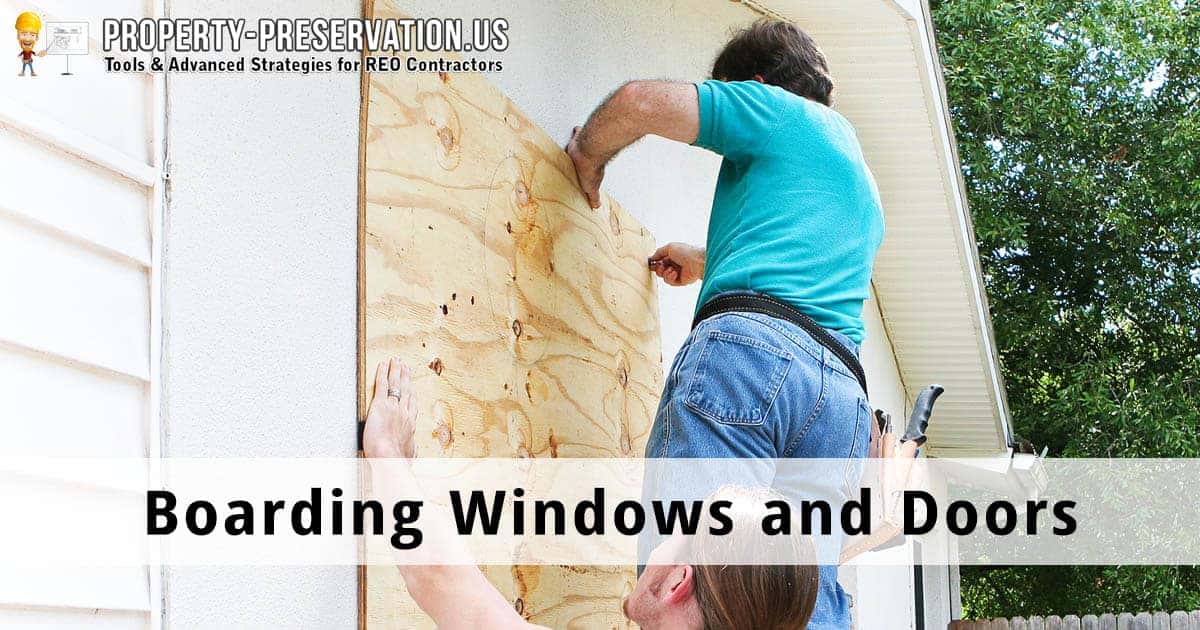



What is a “United Inch”?
A United Inch is a method of measurement used mainly for calculating the price of a task involving windows. To figure out the total united inches of a window, you need to know the width and height of a window and then convert each of the measurements into inches. Next you would add the width of a window (in inches) to the height of a window (in inches) to determine the number of United Inches. For example, a window that measures 24″ wide x 48″ high would be considered 72 United Inches.
Are we allowed to use OSB to boardup windows?
Only plywood may be used. We never use OSB for boarding.
I see in some of the video’s above only (2) carriage bolt were used to board up a window is that the right way? I thought you’re supposed to use (4) carriage bolts
Which are the states that do not allow properties to be boarded?
what is the recommended method for repairing the holes in aluminum windo and door trim and siding?